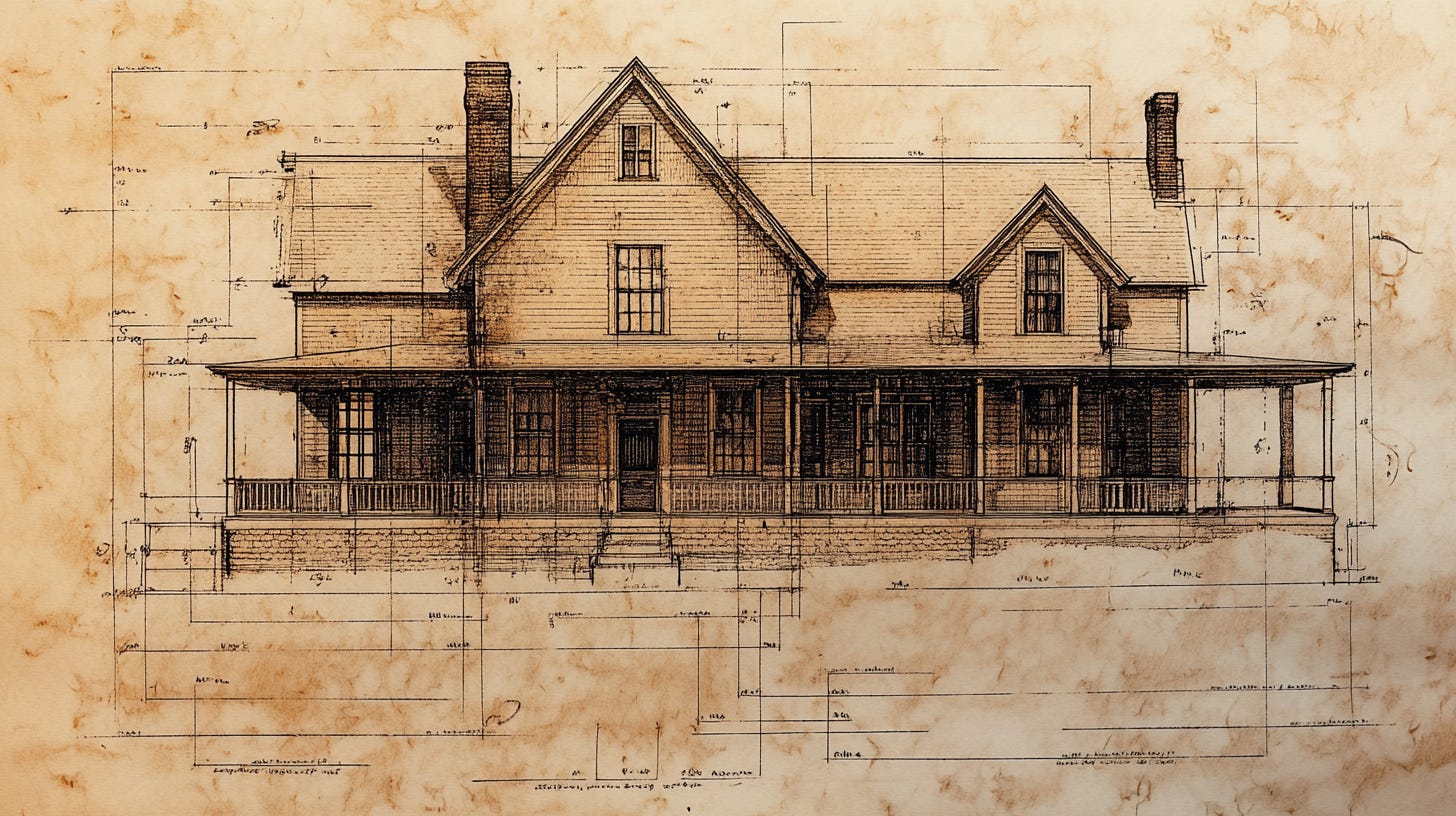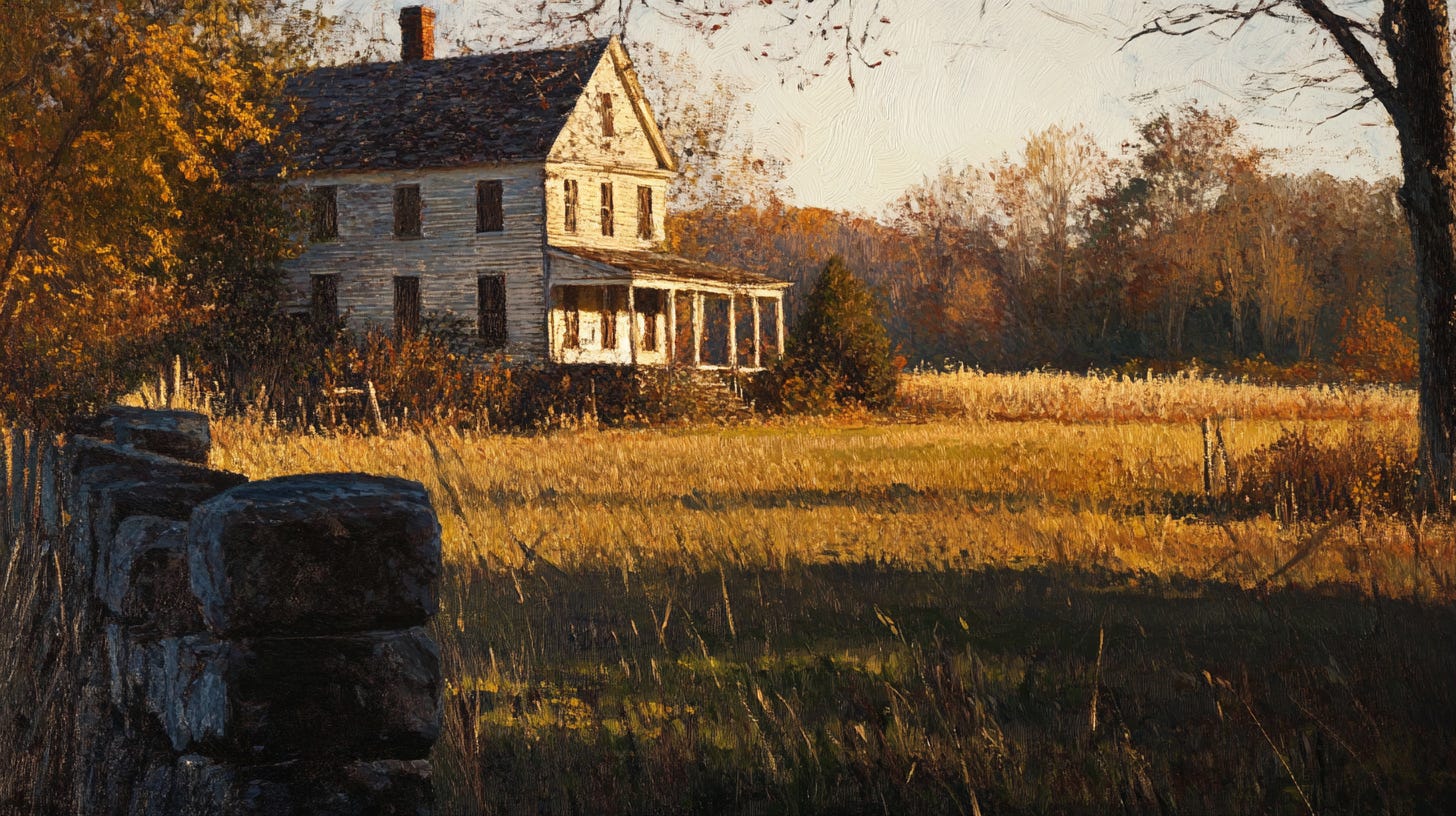Beautifully Dead - Chapter 09
An Immortal Affections serialized novel
The Legal Representative
The law office of Taylor & Whitmore occupied a converted antebellum mansion on Princess Anne Street, its brick facade weathered to a warm patina that spoke of centuries watching Fredericksburg's fortunes rise and fall. Amelia climbed the front steps at precisely ten o'clock, her research bag heavy with questions that had multiplied during her sleepless night at the hotel.
Harrison Taylor emerged from behind a mahogany desk that looked older than the Constitution, his silver hair catching the morning light streaming through tall windows. But it was the man rising from a wingback chair beside him who commanded her attention—elderly, impeccably dressed, with eyes that held the keen intelligence of someone who had spent decades unraveling other people's secrets.
"Dr. Everett," Taylor began, "I'd like you to meet Judge William Harrington, retired. He's been the executor of the Everett trust since 1978."
The old man extended a weathered hand, his grip surprisingly firm. "Dr. Everett. Thank you for making the journey. I imagine this has all been quite unexpected."
Amelia settled into the offered chair, noting how both men watched her with the focused attention of people who had been waiting for this moment longer than she could imagine. "Mr. Taylor mentioned you've been searching for heirs for decades. Why was I so difficult to find?"
Harrington's expression grew thoughtful. "The family line proved... complicated to trace. The property originally belonged to Charles Everett—Thomas's older brother—and his wife Sarah. Charles purchased the land in 1858, but was killed at Gettysburg in 1863, leaving Sarah alone with their infant son."
"Thomas became the guardian?"
"Yes. As Charles's closest male relative, Thomas took responsibility for both Sarah and young Charles Jr. He managed the property throughout the war and after." Harrington opened a thick file. "When Sarah died of fever in 1865, Thomas returned to Massachusetts with four-year-old Charles Jr. and established a formal trust for the boy's inheritance."
Amelia absorbed this information, trying to piece together the family tragedy. "So Thomas raised his nephew in Boston until he came of age?"
"That was the plan. But Charles Jr. disappeared in 1876, when he was fifteen." Harrington's voice carried old frustration. "Simply vanished one day. Thomas spent years searching—hired detectives, placed advertisements in newspapers across the country. Nothing."
"He never reached majority to claim the inheritance?"
"Exactly. The trust documents Thomas had established included provisions for this possibility—if Charles Jr. died or disappeared before claiming his inheritance, the property would pass to the next direct descendant of the original Everett brothers." Taylor explained. "Thomas remained the legal trustee until his death, then our firm took over administration."
"But that should have triggered a search decades ago. Why wait until the 1970s?"
"We did search, but with 1890s investigative methods," Harrington leaned forward. "No DNA testing, no comprehensive databases. Just genealogical legwork, newspaper records, and a lot of educated guessing. It took us until 1978 to finally track down your grandfather as a potential heir from the Everett family line."
"And when you contacted my grandfather?"
"He was... emphatic in his refusal to discuss any Virginia connections," Harrington's voice carried a note of long-held frustration. "Told us he wanted nothing to do with Southern property and asked us never to contact the family again. What he didn't tell us was that he'd had a son who died serving overseas."
"Afghanistan, 2003," Amelia confirmed quietly. "But you said Charles Jr. disappeared in 1876. How does that connect to my grandfather?"
"Different branch of the family tree," Taylor explained, spreading out a genealogical chart. "When Charles Jr. vanished, we had to trace back to find other descendants of the original Everett brothers. Your grandfather descended from a different line—a cousin branch that had moved west in the 1850s."
"The 1970s search required old-fashioned detective work," Harrington continued. "Church records, census data, military service records. We finally located your grandfather in Boston, ironically not far from where Thomas had raised Charles Jr. But– as I said, he was very clear in his refusal."
For the next hour, Amelia reviewed documents that revealed the full scope of her unexpected inheritance. Charles Everett's original property had been substantial, and Thomas's careful management during his guardianship had preserved and even expanded the holdings.
"Thomas was remarkably foresighted," Harrington explained, showing her investment records. "He used the property's income to acquire additional land, support local historical preservation, and ensure the estate would remain financially viable indefinitely."
"The current value is..." Amelia stared at the figures, trying to process the magnitude.
"Approximately $2.3 million in real estate, plus liquid assets of nearly $800,000," Taylor confirmed. "Thomas specified that during any interim period, the funds should support Civil War historical research and preservation efforts."
As they worked through probate procedures, Amelia found herself increasingly fascinated by Thomas Everett's role as both guardian and historical preservationist. The will, established in 1895, revealed someone who understood the importance of preserving not just property but historical documentation.
"He was particularly concerned about the historical materials in the house," Harrington noted. "The trust specifically requires the heir to 'preserve and protect all correspondence, documents, and artifacts of historical significance, ensuring their availability for legitimate scholarly research.'"
"What kind of materials?"
"We believe primarily personal papers—letters, journals, perhaps military documents from Thomas's service as Union chaplain. The house hasn't been fully inventoried since the 1920s." Taylor handed her a set of keys. "That will be one of your responsibilities as the new owner."
"I'll need help understanding the local historical context," Amelia said, thinking of the letters she'd already discovered. "The connections between Thomas and the local community during the war period."
"You'll want to continue working with Elijah Merriweather from the preservation society," Harrington said. "I believe you've already been in contact with him?"
"Yes, he's been very helpful," Amelia confirmed. "He mentioned the connection between his ancestor Dr. James Merriweather and the local Civil War history."
"What Eli may not have mentioned is the extent of his family's private archives," Taylor interjected. "The Merriweathers have maintained extensive personal papers—not just the materials available through the historical society, but original family documents, medical records, even private correspondence from the war period."
Amelia looked up with renewed interest. "Well, he did mention… but, private papers? Beyond what's in the public archives?"
"Considerably more. The family has been quite meticulous about preservation across generations. Eli should have access to materials that could help explain the documented connections between Thomas and Dr. Merriweather—connections that go beyond what's available in official military records."
Taylor consulted his notes. "Eli mentioned he might have original architectural plans for the house—blueprints that could help you understand any historical modifications Thomas made during his time managing the property."
"That would be invaluable. I noticed some unusual architectural features during my initial exploration."
As they concluded the meeting, Amelia found herself holding a substantial folder of documents—deed transfers, investment reports, insurance policies, and most importantly, a complete copy of Thomas Everett's will. The weight of historical responsibility was beginning to settle on her shoulders.
"Dr. Everett," Harrington said as she prepared to leave, "Thomas clearly intended this inheritance for someone who would appreciate both its historical significance and its potential for advancing our understanding of the Civil War period. Your background makes you uniquely qualified to fulfill his vision."
"I'm beginning to understand that," she replied, thinking of the letters waiting in her hotel room and the connections they might reveal.
Walking back to her car, Amelia's mind raced with the implications of what she'd learned. The inheritance wasn't just property and money—it was a family legacy carefully preserved across multiple generations, waiting for someone with the expertise to unlock its historical significance.
Her phone buzzed with a text from her department chair: University closing early due to flu outbreak. Several faculty hospitalized. Recommend extended remote work.
Amelia frowned at the message. She'd been hearing similar reports from colleagues at other institutions—a particularly virulent strain affecting academic communities. The timing was convenient, allowing her to extend her stay, but the pattern was concerning.
She dialed Eli's number, eager to learn more about the local historical connections.
"Dr. Everett?" His voice carried warmth that made her realize how isolated she'd felt since arriving in Virginia. "How did your meeting go?"
"Fascinating. I've inherited quite a complex historical legacy. Judge Harrington mentioned you might have documentation about Dr. James Merriweather's connection to Thomas Everett during the war period."
A pause. When Eli spoke again, his tone had shifted to something more focused, almost excited. "I do have some materials that might be relevant. Family photographs, medical records, and I believe I have a copy of the original house blueprints from when it was first constructed."
"The blueprints would be particularly helpful. I'm trying to understand any modifications Thomas might have made during his time managing the property."
"I can meet you at the house this afternoon if that works. I'd like to see how it's been maintained over the years, and I can bring the documents you'll need."
"Four o'clock?"
"Perfect. And Dr. Everett? You've inherited something quite special. Thomas Everett left a remarkable historical legacy."
After ending the call, Amelia sat in her car for a long moment, studying the will and property documents. The scope of Thomas's foresight was remarkable—he'd essentially created a historical time capsule, preserved and funded for over 150 years, waiting for the right descendant to unlock its secrets.
As she drove back toward the property, her mind kept returning to the tragic family history the lawyers had revealed. A Union chaplain raising his orphaned nephew while managing Confederate territory property—it suggested a story far more complex than simple wartime tragedy.
The afternoon sun cast long shadows across the overgrown yard as she pulled into the drive. The house felt different now that she understood its full history—not just inherited property, but a family legacy born from loss and preserved through careful planning.
For the first time since arriving in Virginia, she felt the weight of being Thomas Everett's chosen heir. Whatever he had preserved within these walls, he had trusted future generations to understand its significance and ensure its proper preservation.
Soon, with Eli's help, she would begin to comprehend the true scope of her inheritance—and perhaps understand why Thomas had considered it important enough to preserve for over 150 years, through war, death, and deliberate family forgetting.
© 2025 E.M. di V. - writing as Morgan A. Drake & Joe Gillis. All rights reserved.




